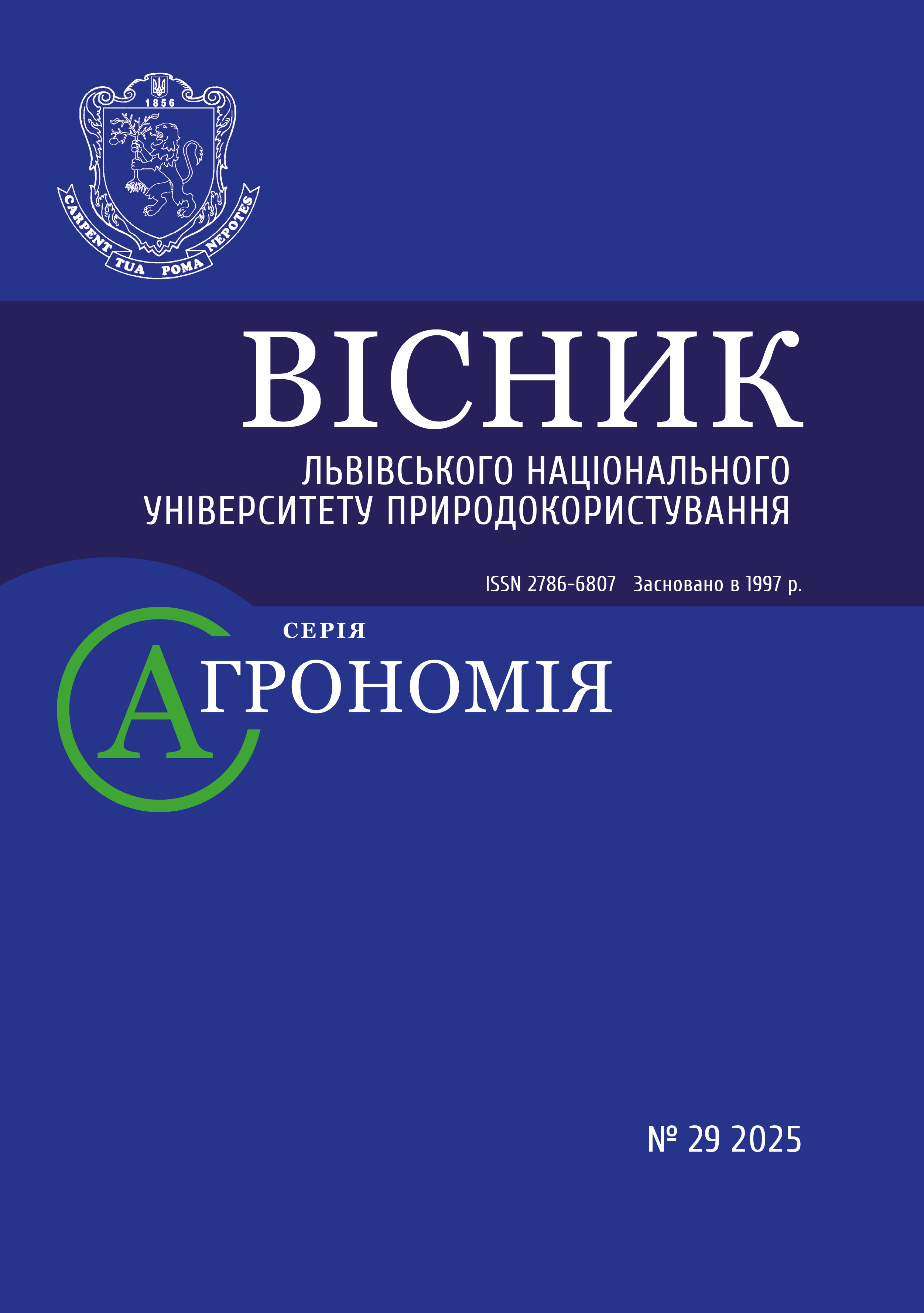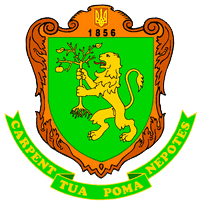EFFECTIVENESS OF INSECTICIDES IN PROTECTING POTATOES FROM COLORADO POTATO BEETLE
DOI:
https://doi.org/10.31734/agronomy2025.29.152Keywords:
potato, pests, Colorado potato beetle, insecticidal preparations, protection of potatoes, harvest of tubersAbstract
During 2022–2023, studies were conducted at the experimental field of the Department of Genetics, Breeding, and Plant Protection of Lviv National Environmental University, located in the Western Forest-Steppe zone of Ukraine. The research focused on evaluating the effectiveness of various insecticides in protecting potato crops from the Colorado potato beetle. Three insecticide preparations were tested: 1. Koragen 20% - a suspension concentrate applied at a rate of 60 ml/ha. 2. Confidor Maxi 70% - water-soluble granules applied at a rate of 50 g/ha. 3. Aktara 25% - water-soluble granules applied at a rate of 60 g/ha. A control group was established with no insecticide application. The research included four potato varieties of different maturity groups, all of which are included in the State Register of Plant Varieties of Ukraine: - Bellarosa (early-ripening) - Vodohrai (mid-early) - Volia (mid-ripening) - Zahidna (mid-late). The results indicated that the new generation insecticides, Confidor Maxi 70% and Koragen 20%, demonstrated high technical efficiency, with effectiveness ranging from 88.2% to 89.4% for Confidor Maxi and 78.2% to 81.2% for Koragen, regardless of the potato variety. The data showed that the level of potato yield was influenced both by the biological characteristics of each variety and by the specific type of insecticide used. On average, over the two-year study period, the potato varieties treated with the systemic insecticide Confidor Maxi 70% produced the highest tuber yields as follows: - Bellarosa: 29.1 t/ha - Vodohrai: 30.4 t/ha - Volia: 33.8 t/ha - Zahidna: 30.9 t/ha. Conversely, the yields from the use of Aktara 25% were significantly lower: - Bellarosa: 25.6 t/ha - Vodohrai: 26.9 t/ha - Volia: 28.6 t/ha - Zahidna: 27.5 t/ha. For reference, the control group yields were markedly lower at: - Bellarosa: 8.6 t/ha - Vodohrai: 11.5 t/ha - Volia: 12.5 t/ha - Zahidna: 11.9 t/ha. To protect potato crops from the Colorado potato beetle in the Western Forest-Steppe zone, it is recommended to use Confidor Maxi 70% at a rate of 50 g/ha and Koragen 20% at a rate of 60 ml/ha. To mitigate the potential development of resistance in pests, it is suggested to alternate the use of these insecticides and to apply them in tank mixtures with recommended fungicides.
References
Alyokhin A. Colorado potato beetle management on potatoes: Current challenges and future prospects. Fruit Veg. Cereal Sci. Biotechnol. 2009. 3. Р. 10–19.
Alyokhin A., Baker M., Mota-Sanchez D., Dively G., Grafius E. Colorado Potato Beetle Resistance to Insecticides. American Journal of Potato Research. 2008. 85 (6). Р. 395–413.
Astakhov O. O., Lasun O. V. Modern methods of control of potato phytophages. Scientific Bulletin of NULES of Ukraine. 2021. No 15. P. 90–98.
Boiko Yu. V. Colorado potato beetle (Leptinotarsa decemlineata Say.) and assessment of resistance of regional potato varieties to its damage under conditions of the Western Forest-Steppe of Ukraine. Scientific Collection: Bulletin of the Steppe. Kirovohrad: “KOD”. 2010. Issue 7. P. 154–157.
Boiko Yu. V. Features of intrapopulation polymorphism of the Colorado potato beetle (Leptinotarsa decemlineata Say.) and its resistance to insecticides in the Western Forest-Steppe of Ukraine. Bulletin of Lviv National Agrarian University: Agronomy. 2009. Issue 13. P. 180–185.
Boiko Yu. V., Kokhanets O. M. Influence of potato varieties with different resistance levels on the dynamics of harmfulness of the Colorado potato beetle (Leptinotarsa decemlineata Say.) in the Western Forest-Steppe of Ukraine: materials of the International Scientific and Practical Forum, September 18–21, 2012. Lviv, 2012. P. 42–46.
Bondarieva L., Mishchuk V., Maksymchuk A. History of pesticide use against the Colorado potato beetle in Ukraine. World Journal. 2021. Issue 9, No 1. P. 138–142. URL: https://doi.org/10.30888/2663-5712.2021-09-01-026
Borzykh O. I., Fedorenko V. P. Current problems of the phytosanitary state of agrobiocenoses in Ukraine. Plant Protection and Quarantine. 2016. Issue 62. P. 3–17.
Brechko E. V. Optimization of insecticide application in the protection of potatoes from the Colorado potato beetle. Agronomist. 2012. No 3 (37). P. 148–151.
Burand J. P., Hunter W. B. RNAi: Future in insect management. J. Invertebr. Pathol. 2013. No 112. Р. 68–74.
Buriak O. V., Sokolov M. P. Influence of biological preparations on the number of potato phytophages. Agriculture of Ukraine. 2020. Issue 5. P. 34–39.
Chabaieva A. K. Selection of phytophage control strategies in potato cultivation. Bulletin of Agronomy. 2021. Issue 10. P. 81–90.
Cong W. A. N. G., Han X. U., Pan X. B. Management of Colorado potato beetle in invasive frontier areas. J. Integr. Agric. 2020, 19, 360–366.
Crossley Michael S., Rondon Silvia I., Schoville Sean D. Effects of contemporary agricultural land cover on Colorado potato beetle genetic differentiation in the Columbia Basin and Central Sands. Ecology and Evolution. 2019. 9 (16).
Dudar I., Dudar O., Korpita H. Effectiveness of insecticides in controlling the Colorado potato beetle. Bulletin of Lviv National Agrarian University: Agronomy. 2020. No 24. P. 172–175.
Horbatiuk O. M., Velychko I. V. Strategies of biological control of phytophages. Bulletin of Ecology. 2022. Vol. 40. No 3. P. 78–85.
Khablak S. Biological preparations for plant protection against pests. Agronomist. 2024. No 4. P. 56–58.
Kliot Adi, Ghanim Murad. Fitness costs associated with insecticide resistance. Pest Management Science. 2012. 68 (11). Р. 1431–1437.
Klymenko L. M. Methods of controlling the number of potato phytophages. Bulletin of Agriculture. 2022. Issue 6. P. 40–48.
Leptinotarsa decemlineata, Colorado Potato Beetle: Synonyms. Encyclopedia of Life. 2017.
Lorenzen J. H., Balbyshev N. F., Lafta A. M., Casper H., Tian X., Sagredo B. Resistant potato selections contain leptine and inhibit development of the Colorado potato beetle (Coleoptera: Chrysomelidae). J. Econ. Entomol. 2001. 94. Р. 1260–1267.
Maharijaya A., Vosman B. Managing the Colorado potato beetle; the need for resistance breeding. Euphyticа. 2015. 204. Р. 487–501.
Melnychuk F., Alieksieieva S., Hordiienko O., Melnychuk L. Effectiveness of insecticides against major potato phytophages under sprinkler and drip irrigation. Biological Systems: Theory and Innovation. 2020. Vol. 11, No 3. P. 92–105.
Methods of Testing and Application of Pesticides / S. O. Trybel, D. D. Siharova, M. P. Sekun, O. O. Ivashchenko et al.; edited by Prof. S. O. Trybel. Kyiv: Svit, 2001. 448 p.
Oerke E. C. Crop losses to pests. J. Agric. Sci. 2006. 144. Р. 31–43.
Oliinyk T. M., Podberezko I. M., Koval V. S. Evaluation of potato varieties for field resistance against the Colorado potato beetle. Plant Protection and Quarantine. 2016. Issue 62. P. 306–315.
Radcliffe E. B., Lagnaoui A. Pests and Diseases. In: Vreugdenhil D., Bradshaw J., Gebhardt C., Govers F., Taylor M. A., MacKerron D. K., Ross H. A., editors. Potato Biology and Biotechnology: Advances and Perspectives. 1st ed. Elsevier; Oxford, UK. 2007. Р. 545–554.
Sekun M. P. Problems of integrated pesticide use in plant protection. Bulletin of Agrarian Science. 2002. No 10. P. 24–25.
Sekun M. P., Koshevska N. M. Role of varietal characteristics of host plants in the sensitivity of phytophages to insecticides. Plant Protection and Quarantine. 2001. Issue 47. P. 94–106.
Sekun M. P., Manko O. V. Resistance of harmful arthropods to modern insectoacaricides and ways of formation of resistant populations. Integrated Plant Protection at the Beginning of the 21st Century: materials of the International Scientific and Practical Conference. Kyiv: Koloobih, 2004. P. 294–298.
Serhiienko V. H., Shyta O. V. Application of chemical and biological preparations in the system of potato protection against pests. Quarantine and Plant Protection. 2013. No 10. P. 12–15.
Shyta O. V. Protection of potatoes against major diseases and pests. Quarantine and Plant Protection. 2019. No 1–2 (253). P. 18–20. 33. Shyta O. V. Protection of potatoes against major pests and diseases. Agronomist. 2020. No 4. P. 18–20.
Shyta O. V., Vergeles P. M., Tsurkan R. P. Colorado potato beetle on potato plantings and control of its population under conditions of the Right-Bank Forest-Steppe. Agriculture and Forestry. 2024. No 34. P. 84–91.
Solomiichuk M. P., Kordulian Yu. V. Use of biological protection systems for potatoes against the Colorado potato beetle (Leptinotarsa decemlineata Say.) and late blight (Phytophthora infestans (Mont.) de Bary). Plant Protection and Quarantine. 2018. Issue 64. P. 208–218.
Sytnyk T. L., Chumak V. I. Integrated control of potato phytophages: modern approaches. Agrarian Economics. 2020. Vol. 42, No 3. P. 30–45.
Thomas Ford. Protect Potato Yields by Managing Colorado Potato Beetles. Pennsylvania State University. June 4, 2024. Р. 1–4.
Tkalenko H. M. Biological protection of potatoes from the Colorado potato beetle. Vegetables and Fruits. 2021. No 8. P. 12–18.
Trybel S. O. Once again about the Colorado potato beetle. Quarantine and Plant Protection. 2008. No 8 (146). P. 2–4.
Trybel S. O. Resistant varieties: problems and prospects. Quarantine and Plant Protection. 2005. No 6. P. 3–5.
Trybel S. O., Hetman M. V., Hrykun O. A. et al. Resistant varieties – a radical solution to the problem of plant protection. Plant Protection and Quarantine. 2006. Issue 52. P. 71–89.
Trybel S. O., Korol T. S. Colorado Potato Beetle. Kyiv: Svit, 2001. 31 p.
Weber D. Colorado beetle: pest on the move. Pesticide Outlook. 2003, 14 (6): Р. 256–259.
Weber D. C., Rowley D. L., Greenstone M. H., Athanas M. M. Prey preference and host suitability of the predatory and parasitoid carabid beetle, Lebia grandis, for several species of Leptinotarsa beetles. Journal of Insect Science. 2006. 6 (9): Р. 1–14.


